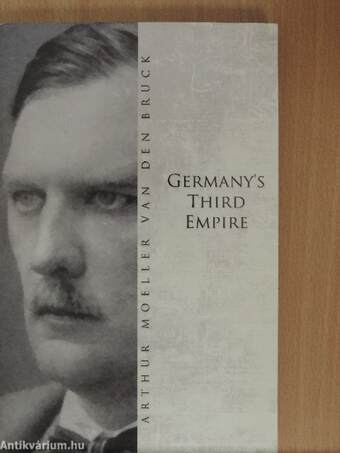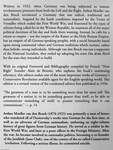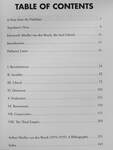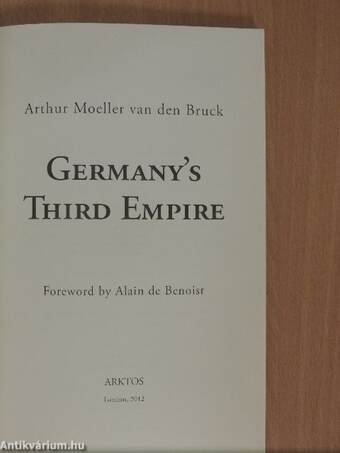1.067.715
kiadvánnyal nyújtjuk Magyarország legnagyobb antikvár könyv-kínálatát

VISSZA
A TETEJÉRE
JAVASLATOKÉszre-
vételek
Germany's Third Empire
| Kiadó: | Arktos |
|---|---|
| Kiadás helye: | London |
| Kiadás éve: | |
| Kötés típusa: | Ragasztott papírkötés |
| Oldalszám: | 249 oldal |
| Sorozatcím: | |
| Kötetszám: | |
| Nyelv: | Angol |
| Méret: | 22 cm x 14 cm |
| ISBN: | 978-1-907166-55-6 |
naponta értesítjük a beérkező friss
kiadványokról
naponta értesítjük a beérkező friss
kiadványokról
Fülszöveg
Written in 1923, when Germany was being subjected to intense
revolutionary pressures from both the Left and the Right, Arthur Moeller van
den Bruck envisioned a Germany that was radical, traditional and
nationalistic. Angered by the harsh conditions imposed by the Treaty of
Versailles which ended the First World War, and frustrated by the types of
reforms being called for in the Weimar Republic, he examines all of the major
political doctrines of his day and finds them wanting. Instead, he calls for a
return to empire - not the empire of the Kaiser or the Holy Roman Empire,
but an empire of all German-speaking peoples, with a social hierarchy based
upon strong communal values and German traditions which nurture, rather
than belittle, strong individuals. Although van den Bruck was not a supporter
of the National Socialists, they ended up adopting his term Das dritte Reich
for the state they intended to build.
With an original Foreword and Bibliography compiled by... Tovább
Fülszöveg
Written in 1923, when Germany was being subjected to intense
revolutionary pressures from both the Left and the Right, Arthur Moeller van
den Bruck envisioned a Germany that was radical, traditional and
nationalistic. Angered by the harsh conditions imposed by the Treaty of
Versailles which ended the First World War, and frustrated by the types of
reforms being called for in the Weimar Republic, he examines all of the major
political doctrines of his day and finds them wanting. Instead, he calls for a
return to empire - not the empire of the Kaiser or the Holy Roman Empire,
but an empire of all German-speaking peoples, with a social hierarchy based
upon strong communal values and German traditions which nurture, rather
than belittle, strong individuals. Although van den Bruck was not a supporter
of the National Socialists, they ended up adopting his term Das dritte Reich
for the state they intended to build.
With an original Foreword and Bibliography compiled by French "New
Right" founder Alain de Benoist, who explains the book's continuing
relevancy, this edition makes one of the most important works of Germany's
Conservative Revolution available again for the English-speaking world. This
edition is a revised version of the condensed edition first published in 1934.
"The greatness of a man is: to be something more than his mere self. The
greatness of a nation is: to be something greater than itself, to be able to
communicate something of itself; to possess something that it can
communicate." — p. 14
Arthur Moeller van den Bruck (1876-1925) was primarily a man of letters
who translated all of Dostoevskys works into German for the first time, as
well as an advocate of German nationalism, authoring an eight-volume
history of great figures from German history. He served as a soldier in the
First World War, and later as a press officer in the Foreign Ministry. After
the war, he became involved in nationalist politics, becoming a co-founder
of the Juniklub (June Club), one of the centers of the so-called Conservative
devolution. Following a serious illness, he committed suicide. Vissza
Témakörök
- Történelem > Társadalomelmélet
- Idegennyelv > Idegennyelvű könyvek > Angol > Történelem > Európa története > Egyéb
- Filozófia > Témaköre szerint > Tanulmányok, esszék
- Idegennyelv > Idegennyelvű könyvek > Angol > Filozófia > Témaköre szerint > Tanulmányok, esszék
- Történelem > Idegennyelvű > Angol
- Történelem > Politika > Belpolitika > Egyéb
- Történelem > Legújabb kor > Egyéb
- Filozófia > Témaköre szerint > Társadalomfilozófia > Egyéb
- Idegennyelv > Idegennyelvű könyvek > Angol > Filozófia > Témaköre szerint > Társadalomfilozófia > Egyéb
- Történelem > Kontinensek szerint > Európa, európai országok története > Nyugat-Európa > Németország
- Történelem > Politika > Pártok, szervezetek
- Történelem > Politika > Ideológiák > Egyéb
- Történelem > Tanulmányok
Arthur Moeller van den Bruck
Arthur Moeller van den Bruck műveinek az Antikvarium.hu-n kapható vagy előjegyezhető listáját itt tekintheti meg: Arthur Moeller van den Bruck könyvek, művekMegvásárolható példányok
Nincs megvásárolható példány
A könyv összes megrendelhető példánya elfogyott. Ha kívánja, előjegyezheti a könyvet, és amint a könyv egy újabb példánya elérhető lesz, értesítjük.







